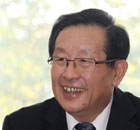Foreign and Military Affairs
China calls for deeper reform at IFIs
By Wang Bo and Ding Qingfen (chinadaily.com.cn)
Updated: 2010-11-12 19:45
 |
Large Medium Small |
SEOUL, South Korea - China on Friday called for further governance reform at international financial institutions (IFIs), making them more representative by giving more senior positions to people from the emerging economies.
In a speech at the G20 summit in Seoul, Chinese President Hu Jintao welcomed the International Monetary Fund's earlier decision to shift more than 6 percent of its voting shares to dynamic developing countries, but said the quota transfer "is just a starting point".
| ||||
The IFIs are traditionally dominated by western countries. Only a few Chinese can take high-level position at IFIs, even though China will rise to the third largest shareholder at the IMF after the quota transfer.
Zhu Min, a former deputy central banker, was named as the special adviser to IMF Managing Director Dominique Strauss-Kahn last year, while Justin Lin, a former professor at Peking University, now works as the chief economist of the World Bank.
Gregory T. Chin, senior fellow of the Center for International Governance Innovation of CIGI, Canada-based think-tank, said the adjustment of the voting share is just a beginning of the experiment of whether it's possible to restore the legitimacy of IMF.
"If the IMF legitimacy can be restored to some extent, then the developing countries may not feel the need to accumulate so much foreign currency reserves, but right now, they don't have the alternatives," Chin said.
In a joint communiqué issued by the G20 countries after the Seoul Summit, leaders pledged to effectively implement the quota and governance reform and committed to complete the quota share shift by 2012.











